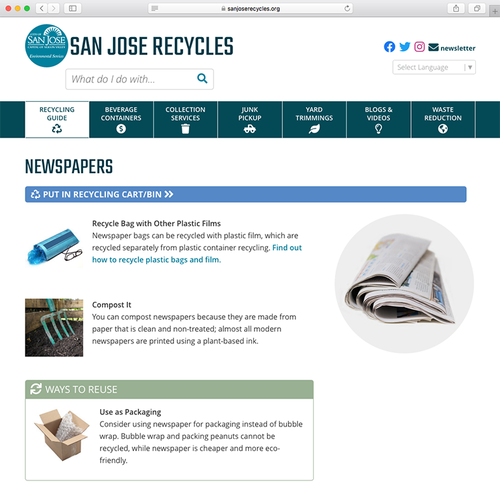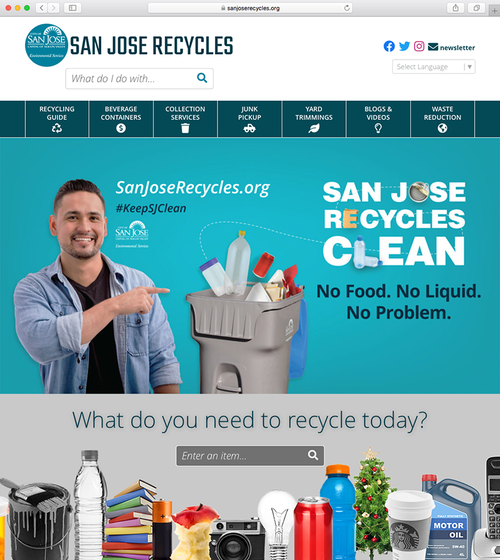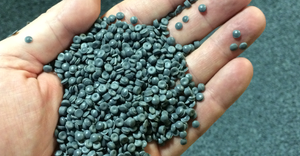San Jose, Calif.’s Recycle Right Campaign Sends Clear Message
The city’s Recycle Right campaign aims to improve recycling practices and includes multiple “tactics” such as social media ads and community events.

San Jose, Calif.’s residential recycling contamination rate has barely changed in 10 years, due largely to challenges around communication with a culturally and socioeconomically diverse population in a huge city. Plus, San Jose has three residential trash haulers, each with its own way of conveying recycling instructions.
To send a clearer message and ultimately capture more clean materials, the city adopted a new game plan: developing and taking full ownership of a major, multipronged outreach project, which launched last summer.
This project is coined as Recycle Right, a campaign that aims to improve recycling practices and includes multiple “tactics” such as social media ads and community events, with the centerpiece tactic being a new website, SanJoseRecycles.org.
The site includes news, information about recycling programs, videos and a searchable database of about 300 items to help residents know exactly what they can put in the gray bin.

“By owning the outreach, we can have one universal message across the city to help us meet our own goals, the state’s diversion goals and address challenges related to China’s National Sword that have impacted both domestic and global commodities markets,” says Kerrie Romanow, director of the city of San Jose Environmental Services Department (ESD) and chief sustainability officer for the city.
“We are focused on making sure the materials put in the recycling cart are the right materials and will not render the balance of the cart not marketable,” she says.
The Recycle Right campaign includes ads of digital, newspaper and TV formats, among messaging tactics to drive different audiences to the website.
ESD also has a partnership with San Jose Earthquakes, a soccer team that appears in multimedia ads promoting Recycle Right. These messages and others are also splashed across public transit buses, complementing efforts such as direct mail and flyers distributed at libraries, community centers and community events.
“Residents see messages on community bulletin boards when they go to the library. Then, they walk outside and may see the Earthquakes on a bus. They could be sitting at their computer searching for something and a Google display ad may pop up, or they may see an ad on their social media feed—all of which connect them to SanJoseRecyles.org,” says Jennie Loft, public information manager at San Jose ESD.
Ads appear in Spanish, Vietnamese and English. ESD staff give presentations at neighborhood association meetings in each of these languages, depending on the neighborhood, and talk at community events. Most recently, a Vietnamese-speaking staff person spoke at one of the most popular attractions among San Jose’s Vietnamese community: a celebration of the Vietnamese Lunar New Year that draws 20,000 to 30,000 people every year.
“We get a range of questions [wherever we present], from can you recycle a certain item to how do you compost?” says Loft.
The digital ads have been especially advantageous in that they provide detailed analytics to understand what draws viewers and gauges traffic.
“We use analytics to see if we are on target to reach our goal, which is to get people to the site,” says Loft, adding that Google display ads in particular work well.
ESD conducted resident surveys at the beginning of its campaign to understand audiences, to learn residents’ attitudes about recycling and to gauge their awareness about the practice to know what messaging adjustments to make moving forward.
SanJoseRecycles.org had about 70,000 users six months after going live and averaged 400 visitors a day.
Website developer Recyclist built the platform, working hand in hand with staff from ESD’s Communications division and its Integrated Waste Management division.
“When they came to us, they had planned out the Recycle Right campaign, but you need more information than you can get on a billboard or other ad venues. And you need somewhere for that information to live,” says Emily Coven, founder of Recyclist.
The landing page points to how to find additional resources and information specific to San Jose’s program, though the site is based on a template customized for the city.

For example, San Jose has a robust junk pickup program, which became a primary item in the site’s navigation. If residents search for an item and it happens to be eligible for junk pickup, they would discover this when they went to the item.
“We learn a ton with every municipality we work with, as everyone has their own unique challenges to address while we try to figure out how to make complicated information simple and digestible. We worked with [the Recycle Right team] to build new features. For instance, we implemented sticky headers with search functionality where if you scroll down, the sticky header [perhaps “what do I do with clamshells?”] stays at the top of the page, so as you scroll, you maintain access to that functionality,” says Coven.
She also is working with the city to determine how to best utilize voice assistance in conjunction with SanJoseRecycles.org, mainly focused on determining what questions people can ask to get good search results.
Meanwhile, San Jose is in the process of revising its zero waste plan to incorporate a greenhouse gas emissions component.
“Our zero waste goal is that nothing should go to landfill. The website is a great tool to support our work toward our zero waste goal, and the website and campaign go hand in hand,” says Romanow.
About the Author
You May Also Like




